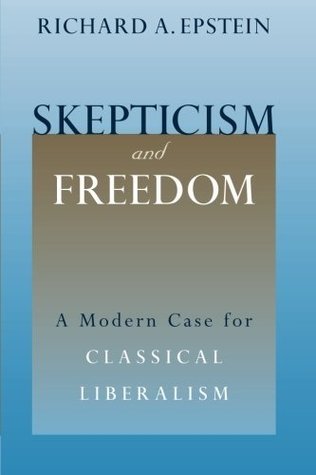What do you think?
Rate this book


320 pages, Paperback
First published June 1, 2003
[Imported automatically from my blog. Some formatting there may not have translated here.]
Amazon kindly informs me that I bought this book on September 22, 2004, over nine years ago. That's how far behind I can get on my reading. (And I'm pretty sure there are older books further down the pile.)
Fortunately, the book's arguments are timeless. That's what I keep telling myself anyway
Richard Epstein has been my nerdy hero especially since then-Senator Joe Biden held up his book Takings during the confirmation hearings for Clarence Thomas as an example of what no decent human being, let alone a prospective Supreme Court Justice, could subscribe to. Epstein's thoughtcrime in that book was to object to government's unlimited eminent domain power.
Epstein didn't, mind you, object to eminent domain totally. In fact, he held that some sort of eminent domain power was necessary for the proper functioning of government. But he argued that many government activities should be regarded as "takings" of private property, and therefore meet the requirements of the Fifth Amendment: that they be for "public use", and that there must be "just compensation." And to Biden, the notion that the state could not do whatever struck its fancy in the economic sphere was complete heresy.
Since then, Epstein has written a series of books defending "classical liberalism", (he has a new one[image error] coming out next month, I see). As befits a University of Chicago Law Professor, his arguments tend to discuss things from a legal perspective, as opposed to a philosophical or economic one. He contends that the law (properly understood) contains features of an "emergent order", where centuries of messy practice and evolution have assembled into a coherent working system. Like the parallel economic system, what results isn't flawless. It's just far superior than what could have resulted from the top-down design fantasies of utopians.
In this book, Epstein first lays out his views of the classical liberal vision: strong respect for individual autonomy and responsibility, and private property rights. The state's role is to provide physical and legal infrastructure (backed up by, yes, eminent domain when called for) and protection of the citizenry against aggression and monopoly. This is a somewhat more expansive role for the state than envisioned by libertarians that lean toward anarchy, but Epstein's arguments are strong.
In the remainder of the book, Epstein lays out his rebuttals to a various modern challenges to classical liberalism: attacks on its moral foundations and its assumptions about human nature. And, as far as I can tell, he does a fine job there too.
Because I have to be honest: the book is very heavy intellectual lifting. Epstein is a vigorous participant in high-level intellectual debates that have been going on for decades, some of them centuries. This book presumes an everyday familiarity with the topics that many more casual readers (specifically: me) lack. Not saying I couldn't get up to speed by reading me some Amartya Sen, Joseph Raz, etc. And then pursuing a law degree. And then rereading relevant sections of this book. But that's not likely to happen.
Arguably, Epstein could have written more accessibly. Less legal-brief prose, more like Jonah Goldberg or Kevin G. Williamson. He's no Milton Friedman either.
Never mind that, though. Epstein's still one of my heroes, even if I can't understand him as well as I would like.